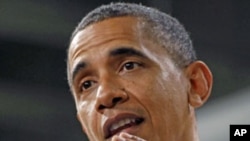In the past week of market turbulence, President Barack Obama faced mounting criticisms of his leadership and economic policies. Some of this came from 2012 Republican presidential candidates, but also from some prominent columnists and African-American figures. The White House has responded, as the president intensifies defenses of his policies.
Stronger critiques of Mr. Obama have come in the wake of his difficult compromise with Republicans for a $2.4 trillion deficit and debt reduction package, and amid the wildly fluctuating stock market after the U.S. creditworthiness downgrade by a major rating agency.
Critiques also focus on what most economists now agree is the fact that the president's $800 billion stimulus, passed by Congress two years ago responding to the financial crisis and recession, was insufficient to boost job growth and sustain recovery.
Among the 2012 Republican candidates seeking to replace Mr. Obama in the White House, Former Massachusetts Governor Mitt Romney is using increasingly sharper language to challenge what he calls the president's lack of experience.
Romney said this at Thursday's Republican candidates debate in Iowa.
"I'm not going to eat Barack Obama's dog food. What he served up was not what I would have done if I had been president of the United States," said Romney.
Some of the harshest assessments of Mr. Obama have come from some prominent newspaper columnists who questioned the president's leadership abilities, as well as his personal empathy.
Other commentators, not to mention lawmakers in the far left of Mr. Obama's Democratic party, have questioned his determination to stand up to what the president himself has called Republican intransigence.
Mr. Obama is certainly not the first president of either major political party to face such harsh critiques at this stage in his first term.
But for the nation's first African-American president, remarks in recent months by two prominent African-American figures may have carried a more painful sting.
The outspoken Princeton University Professor Cornell West stirred controversy earlier this year by saying Mr. Obama was in danger of being "another black mascot of Wall Street oligarchs."
That's a reference to criticisms that Mr. Obama has been too close to banks and other powers on Wall Street, even as he attempts to further economic recovery and grow jobs.
Other criticism has come from prominent African-American television personality Tavis Smiley, who with West has traveled across the country in a "Poverty Tour" to, as Smiley puts it, hold Mr. Obama "accountable."
Asked about such criticisms during a recent news briefing, White House Press Secretary Jay Carney said the president remains focused not only on improving the economy overall, but also on those who are struggling the most.
"This president is very focused on every American who is suffering during these turbulent economic times and the policies that he has espoused and that he has pushed take into account very seriously those who are most affected," said Carney.
Despite the criticisms from these two high profile African-Americans, Mr. Obama’s support among African-Americans remains generally strong, though some recent polls show signs that such support could be weakening.
White House officials say the president remains focused on the toll that the financial crisis has taken on African-American and other minority communities, a reminder of which he received in person in July when he met with Marc Morial, head of the National Urban League.
"The black unemployment rate continues to rise, notwithstanding the fact that you do have job creation in the private sector," said Morial.
With recent stops across the country, at campaign fundraisers, and in next week's three-state bus trip in the U.S. midwest, Mr. Obama is intensifying his responses and explanations of his policies.
At a battery factory in Michigan this past week, he urged Americans to pressure members of Congress to stop what he called partisanship and gridlock that he said have undermined public confidence.
"You have got to tell them you have had enough of the theatrics, you have had enough of the politics, stop sending out press releases, start passing some bills that we all know will help our economy right now. That's what they need to do, they have got to hear from you."
Traveling again next week in Minnesota, Iowa and Illinois, including several Town Hall meetings, Mr. Obama will hear again from Americans about their frustrations with the economy.
On Friday, Deputy Press Secretary Josh Earnest said he will make additional points about "the strident position" of some in Congress, a reference to Republicans and Tea Party lawmakers, to increasingly "put party ahead of country."
However, the White House said Mr. Obama also is prepared for questions he will face from some who voted for him in 2008 about compromises he has been willing to make with Republicans.
Upon his return, the president is due to leave for a 10-day vacation with his family in Martha's Vineyard in Massachusetts.
At a time of financial turmoil, would this give the wrong impression? Press Secretary Jay Carney told reporters this week Americans would not "begrudge" Mr. Obama spending some time with his family, adding that in reality "there is no such thing as a presidential vacation."
Obama Weathers Criticisms on Leadership, Economic Policies
- By Dan Robinson
















